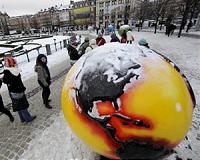| . |  |
. |
Birmingham AL (SPX) Dec 21, 2009 Those seeking to understand and predict climate change can now use an additional tool to calculate carbon dioxide exchanges on land, according to a new scientific journal article. The research, publishing in the Proceedings of the National Academy of Sciences' Early Edition, incorporates into global computer models the significant impact an enzyme, carbonic anhydrase, has on the chemical form of carbon dioxide released from the soils and reduces uncertainties in estimates of CO2 taken up and released in terrestrial ecosystems. The same enzyme is present in foliage and soils, but leaves a different imprint on CO2 involved in photosynthesis and respired by soils. "Our paper presents measurements from all the major regions of the world where we have experimentally determined the effect of this enzyme, produced by many microorganisms, on carbon dioxide released from the soil," said Dr. Behzad Mortazavi, an assistant professor of biological sciences at The University of Alabama, and a co-author of the article. In computer models used to estimate and predict carbon dioxide, or CO2, exchange, scientists had previously incorporated the role this enzyme plays in the vegetation, but had neglected to include its role in soils, according to the collaborative paper written by 18 co-authors from around the world. Revising the computer model predictions to take the soil enzymes' impact on CO2 into account reduces the discrepancies between the model and atmospheric observations, according to the paper whose lead authors are Lisa Wingate and Jer�me Ogee, representing the University of Edinburg and the French National Institute for Agricultural Research, respectively. While scientists had suspected the enzyme was also active in soils, Mortazavi said the impact of the enzymes within soil on CO2 had been difficult to measure and thereby was not factored into the computer models. In order to effectively tackle the complexities regarding human's impact on climate changes, it's important to accurately understand the natural processes, the UA scientist said. "In general, it's very challenging to determine how much carbon is taken up by photosynthesis versus how much carbon is released by respiration," Mortazavi said. "It's important to know the contributions of these two processes because as the climate is warming, the balance between carbon taken up and released on land will change. Warmer temperatures can increase the microbial activity in the soils, leading to a greater release of CO2 from the soil." Ideally, the amount of carbon dioxide removed naturally through the carbon cycle balances the total carbon dioxide emissions. The amount of carbon released into the atmosphere has grown out of balance because of the increased number of human activities such as the use of fossil fuels, many scientists believe. As the world debates what steps should be taken to address human activities believed to contribute to climate change, Mortazavi said it's important the naturally occurring processes are measured accurately, something to which this research will contribute. "This is an additional tool to look separately at the uptake of CO2 by photosynthesis, on the one hand, and, on the other hand, the release of CO2 by respiration." Share This Article With Planet Earth
Related Links University of Alabama Climate Science News - Modeling, Mitigation Adaptation
 China becomes quiet climate kingmaker
China becomes quiet climate kingmakerCopenhagen (AFP) Dec 20, 2009 China's complicated relationship with the West is casting a cloud over global talks on climate change, contributing to the tepid outcome of the high-stakes Copenhagen summit, observers say. China, the top emitter of greenhouse gases blamed for global warming, played its cards close to its chest at the 12-day summit with Premier Wen Jiabao moving little beyond previous statements. But China ... read more |
|
| The content herein, unless otherwise known to be public domain, are Copyright 1995-2009 - SpaceDaily. AFP and UPI Wire Stories are copyright Agence France-Presse and United Press International. ESA Portal Reports are copyright European Space Agency. All NASA sourced material is public domain. Additional copyrights may apply in whole or part to other bona fide parties. Advertising does not imply endorsement,agreement or approval of any opinions, statements or information provided by SpaceDaily on any Web page published or hosted by SpaceDaily. Privacy Statement |